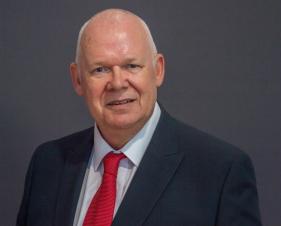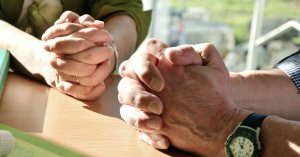We don't think religious worship should play any part in the formal business of the state.
We want to see parliamentary and local government meetings conducted in a manner equally welcoming to all attendees, whatever their personal beliefs.
Parliamentary prayers
Sittings in both the House of Commons and the House of Lords begin with Anglican prayers. MPs and peers stand for prayers facing the wall behind them – a practice thought to have developed due to the difficulty members would historically have faced of kneeling to pray while wearing a sword.
When the chamber is at its busiest, parliamentary prayers act as a bizarre and antiquated seat reservation system. Even MPs and peers who are slated to speak have no option but to attend prayers in order to reserve a seat.
Whilst they may be viewed by some as an important tradition, parliamentary prayers serve to assert the superiority of Christianity (and the Church of England in particular) at Westminster. This 'tradition' is inimical to a modern, pluralistic, secular democracy.
In the Scottish Parliament, Tuesday afternoon sessions begin with 'Time for Reflection', with faith and belief representatives invited to addresses members for up to four minutes. The Northern Ireland Assembly begins formal business with a period of two minutes of silent prayer or contemplation. The Welsh Assembly has adopted no such rituals.
Parliamentarians who wish to pray are free to do so. But prayers should not form part of the official business of Parliament.
Council prayers
Many local authorities in Britain also begin their meetings with prayer.
Local democracy should be equally welcoming to all sections of society, regardless of their religion or belief. Council meetings should be conducted without anyone feeling excluded, or compelled to either participate in prayers or absent themselves from part of the meeting.
Council prayers open the door to wholly unnecessary conflict and sectarian squabbles within local authorities. There is a history of local councillors being bullied and marginalised for challenging council prayers.
The absence of prayers from the formal business of meetings in no way impedes religious freedoms or denies anybody the right to pray. Conversely, organised worship in secular settings imposes worship on those who do not share the faith. A genuine commitment to freedom of religion or belief is incompatible with including acts of worship in the formal business of council meetings.
If local authorities wish to hold a moment of silent reflection at the beginning of a meeting, or if councillors wish to meet for prayers prior to the meeting, they are at liberty to do so.
Take action!
1. Write to your MP
Please enter your postcode and urge your MP to support an alternative to parliamentary prayers, to make parliament more welcoming to people of all faiths and none.
2. Share your story
Tell us why you support this campaign, and how you are personally affected by the issue. You can also let us know if you would like assistance with a particular issue - for example, if you would like to challenge prayers at your own council.
3. Join the National Secular Society
Become a member of the National Secular Society today! Together, we can separate religion and state for greater freedom and fairness.
Latest updates
New council chair scraps prayers during meetings on Isle of Wight
Posted: Tue, 1 Jun 2021 16:15
The new chair of the council on the Isle of Wight has decided to end the practice of saying Christian prayers at the start of meetings.
The decision, which the National Secular Society has welcomed, comes after Geoff Brodie (pictured) was elected as the new chair of Isle of Wight Council last Wednesday.
Councillor Brodie had proposed a motion to end the prayers, which were said as a formal part of the opening proceedings of full council meetings.
The motion was due to be heard at last week's meeting, but became unnecessary when the councillor was elected as chair.
The chair of the council is allowed to choose whether or not to appoint a chaplain to say prayers, and Cllr Brodie decided not to do so.
He has called for the end of council prayers since being elected to the council in 2005, arguing that they were discriminatory.
Chair explains his decision
Cllr Brodie told the NSS: "It has been my long held view that prayers have no place in a secular organisation like a local authority.
"I have battled for an end to this practice for 16 years, to no avail. Now that I have been elected as chair I had the power to end the practice.
"The general view seems to be that it was about time. Hopefully my decision will be maintained once I stand down in a year's time."
The councillor also told the BBC: "If people want to take prayers or have periods of contemplation before full council I am more than happy to see that, but it will not be part of the formal part of this agenda."
Council prayers across England
The Local Government (Religious Etc. Observances) Act enables a majority of councillors to impose acts of worship on other councillors as part of the official business of meetings in England.
The act was passed in 2015, after the NSS won a legal challenge at the High Court three years earlier. The court ruled that councils did not have the authority to include prayers on the agendas of council meetings.
A number of local authorities in England now begin their meetings with prayer as part of their official business, although others recognise that the practice is inappropriate.
The NSS argues for the end of prayers as part of official government business both locally and nationally.
NSS comment
NSS head of policy and research Megan Manson welcomed the decision.
"The practice of saying prayers during council meetings imposes a particular form of religious worship on those who often have no wish to take part in it. It is discriminatory, alienating and unnecessary.
"Councillor Brodie is quite right to bring it to an end on the Isle of Wight, and councils across England who continue to impose worship on councillors should take note. Local government meetings should be equally welcoming to all, regardless of their religion or belief."
Image © Isle of Wight Observer.
NSS welcomes decision not to hire chaplain to say council prayers
Posted: Thu, 10 Sep 2020 15:02
The National Secular Society has welcomed a decision by the mayor of Swale borough council in Kent not to appoint a civic chaplain to conduct council prayers.
Paul Stephen, of the Swale Independents Alliance, has said he will not replace an outgoing chaplain after the council recently passed an equality and diversity motion.
He told local paper Kent Online two weeks ago: "As we live in a multi-faith society, myself and a large majority of the coalition decided that employing the services of just one faith was not in keeping with the equality and diversity motion."
Swale borough council is currently run by a coalition of independent, Labour, Liberal Democrat and Green councillors.
In a letter to the council, NSS chief executive Stephen Evans expressed support for the mayor's decision.
He said: "We agree that local government meetings should be conducted in a manner equally welcoming to all attendees, irrespective of their personal beliefs."
The letter also said council prayers may contribute to rising political disengagement, as they fuel feelings of alienation within an increasingly secular and religiously diverse society.
Explaining the NSS's decision to send the letter, Mr Evans said: "Holding prayers as part of council meetings imposes one set of religious beliefs on councillors who may not share them.
"It's an exclusionary practice which undermines democratic principles and efforts to encourage a diverse range of people to engage in politics.
"Swale and other councils which currently hold prayers within official business should now either replace them with a more appropriate alternative or scrap them."
The mayor's decision has been criticised by the outgoing chaplain, Colin Johnson, and a local reverend.
Notes
- The Local Government (Religious Etc. Observances) Act enables a majority of councillors to impose acts of worship on other councillors in England. A number of local authorities begin their meetings with prayer as part of their official business.
- In 2013 an investigation found more than three-quarters of local councils do not hold prayers at meetings.
- According to the 2019 British Social Attitudes survey over 50% of the population have no religion. Just 12% of Britons are affiliated to the Church of England, including just one per cent of young adults.
Image by congerdesign from Pixabay.




